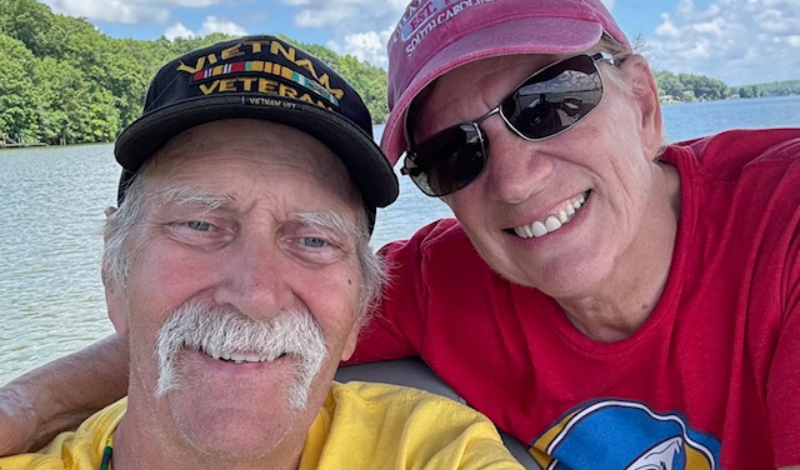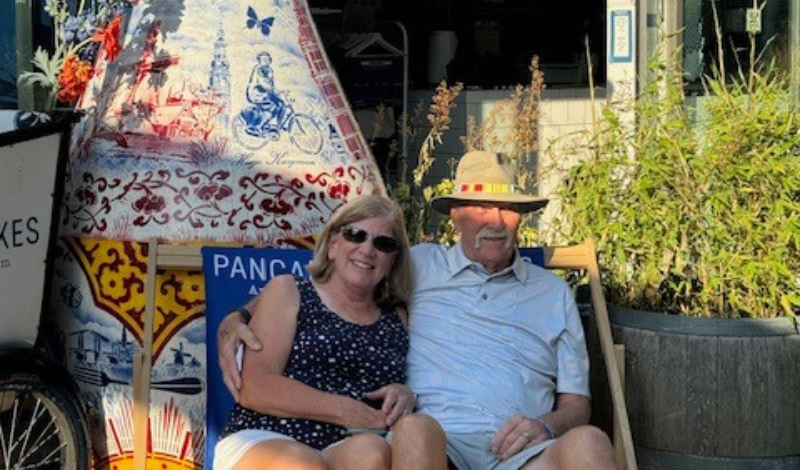
Like many lung cancer patients, Jim Fackler’s journey to an accurate diagnosis had some twists and turns, some unfortunate timing, and some unexpected good luck. A protein in his lung tumor led him to a clinical trial for small-cell lung cancer that proved to be a lifesaver – literally.
Severe Cough and Covid Double Whammy
In June of 2021, Jim Fackler started coughing. By July the severity of his cough had intensified from annoying to debilitating. He recalls spending the better part of the day and night fighting the pain and exhaustion caused by the relentless cough. As a Veteran having served in Vietnam, Jim was an established patient of the Veterans Administration, but, because of Covid restrictions, he was unable to be seen by a physician and was limited to communicating via email. Based on what the doctor could glean from their email exchange, Jim was presumed to be struggling with asthma and was prescribed an inhaler to quell his symptoms.
Frustrated by the lack of relief from the inhaler, Jim, along with his wife (and stalwart sidekick) Gail, decided to seek a private physician’s opinion. Upon physical examination and hearing about the severity of the symptoms, Jim recalls the doctor saying that, while he did not want to disagree with Jim’s current diagnosis of asthma, he wanted to take a different approach. He ordered a CT scan for that same day.
An Unexpected Lung Cancer Diagnosis
Just a few hours later, Jim received a call from the doctor, asking him to come in to discuss the results. With a diagnostic report in one hand and an undeniably sorrowful look on his face, the doctor reported,
“There is no easy way to say this, you have extensive lung cancer”.
Jim and Gail were astounded. Given his history of having served in Vietnam and being a former smoker (he quit 25 years before this diagnosis), they were half-expecting to be told he had COPD (chronic obstructive pulmonary disease) or perhaps Emphysema. Neither of them expected lung cancer. But here they were, and there was no time to muse over anything – they had to spring into action.
The next day, armed with the diagnostic report, the doctors at the VA saw Jim immediately. Given the dire nature of Jim’s diagnosis, the physician wrote a community care letter in support of requesting additional services that would be outsourced – but paid for by the VA – to private medical systems.
Advances in Lung Cancer Research Bring Hope
Soon after, Jim and Gail traveled to Charlotte, North Carolina, where they met with both an oncologist and a pulmonologist. A PET scan – an imaging procedure that uses radioactive substances to create detailed 3D images of the inside of the body was ordered. The results: Extensive stage small cell lung cancer consisting of three masses in the upper right lung with metastases in the brain, hip, and abdomen. By all accounts, a very serious diagnosis.
Jim recalls his first ray of hope:
“The pulmonologist told us straight up that, had I been dealt these cards five years ago, I would be dead. But, because there has been so much progress and so many advances in lung cancer research, we have more options than ever before”.
Key Clinical Trial for Small Cell Lung Cancer
From there, Jim underwent a biopsy not only to confirm his diagnosis but to determine if his lung cancer carried a particular protein that would qualify him to be part of a clinical trial. Because he did, indeed, have that protein, Jim was able to have chemotherapy and radiation.
Chemotherapy treatments began right away and continued for nearly four months. Once complete, and because his cancer is considered a rapid spreader, Jim opted to undergo ten rounds of radiation. Despite (or perhaps despite) feeling quite awful and spending a lot of time sleeping, the efficacy of the treatment was remarkable: the lesions in the brain, hips, and abdomen were all gone, and the 5-centimeter mass in his lung was reduced to 2.1 centimeters!
Nothing Slows Down Jim’s Spirit
For the following eight months, Jim was in a good stretch. He felt great, was in no pain, and enjoyed long invigorating daily walks with Gail. Then one day, in December 2022, as they were on the return trip of their walk, Jim suddenly and inexplicably (to this day) froze, lilting to the left, and was soon unable to move. Instinctively, he knew – and it was later confirmed – that this symptom was not a stroke. Countless specialists have been perplexed by this turn of events and struggle to determine what happened and why the symptoms continue. As a result of that incident, Jim’s ability to walk and speak remains impaired. His cognition, however, is decidedly not impacted.
Neither lung cancer nor issues with walking and talking have slowed down Jim’s spirit. Since his diagnosis, he and Gail have traveled to Europe, attended the Hot Air Balloon Festival in Albuquerque, and recently returned from a trip to Belgium and Amsterdam!

Small Cell Lung Cancer Clinical Trial Allows for Love and Joy
As of July 2024, Jim’s scans were good. Despite the challenges he deals with daily concerning walking and talking, he is living a life of love and joy alongside his trusty first mate, Gail.
Together, they have tackled the medical system and advocated for what they felt was necessary for Jim’s treatment and quality of life. Despite the seriousness of Jim’s diagnosis, they can easily chuckle together. Their connection and support for one another are unmistakable; Gail has a deep empathy and support for Jim’s needs, and he is grateful and appreciative of the issues inherent in being a caregiver.
“Gail and I have had some serious talks about slowing treatment, but we are all going to die, we just don’t know the why, where, or when. I just love that I get to spend more time with Gail. I’ve had two near-death experiences. What bothers me is that when the day comes, I won’t be there for her.”
I’m using my lungs to advocate
As a member of LCFA’s Speakers Bureau, I’m advocating for research and raising awareness through the media, embodying hope and action.
View Speaker Profile
